NCA History Program
General History
History and Development of the National Cemetery
NCA's solemn mission originates with the Civil War. Today it is responsible for 156 national cemeteries, 35 soldiers' lots and 122 VA grant-funded state, territory and tribal Veterans cemeteries in the U.S. and its territories, and the provision of headstones and other memorial benefits to qualified Veterans.
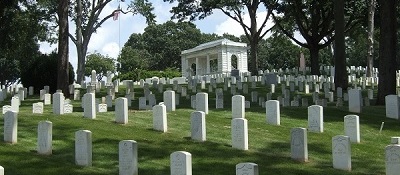
Dates of Establishment: National Cemeteries & NCA Burial Sites
A listing of VA National Cemeteries & NCA Burial Sites and their dates established.
History of Government-Furnished Headstones and Markers
The evolution of government headstones.
Lincoln's Gettysburg Address in the National Cemeteries
The affiliation among President Abraham Lincoln, his Gettysburg Address, and the national cemeteries is relevant today. The speech Lincoln gave at the dedication of the Soldiers' National Cemetery in Pennsylvania on November 19, 1863, is iconic.
Memorial Day History
Memorial Day, a federal holiday held the last Monday in May, is the nation's foremost annual day to mourn and honor its deceased service men and women. Originally called Decoration Day, it was formalized by a "Memorial Day Order" issued by Grand Army of the Republic Commander-in-Chief John A. Logan in 1868.
The story of NCA's Presidential Memorial Certificate
The VA Presidential Memorial Certificate was intended to be given to a Veteran's next of kin or friends. World War II Army Veteran Benjamin B. Belfer proposed the idea of a Presidential Memorial Certificate that VA could give to a Veteran's next of kin.
Leadership: Directors & Under Secretaries for Memorial Affairs, 1973 to Present
Learn about the leaders who helped shape NCA.
Landscapes of Honor & Sacrifice: The History of the National Cemeteries, 2003
A 30-minute video illustrating the rich history of the national cemeteries.
NCA History Blog
Featured Blog Post
Les' Melnyk
Senior Historian, National Cemetery Administration
Published: November 19, 2024
President Abraham Lincoln is one of the most revered figures in American history. Rankings of U.S. presidents routinely place him at or near the top of the list. Lincoln is also held in high esteem at VA. His stirring call during his second inaugural address in 1865 to "care for him who shall have borne the battle and for his widow and his orphan" embodies the nation's promise to all who wear the uniform, a promise VA and its predecessor administrations have kept ever since the Civil War. Read more »
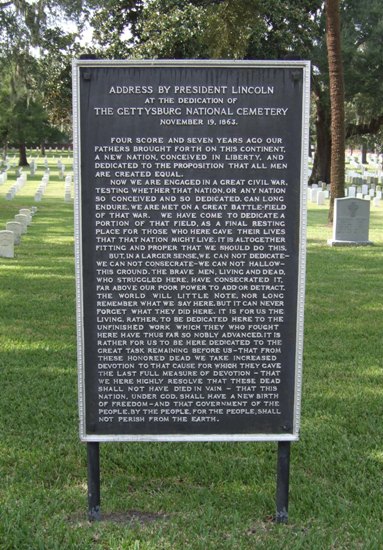 Tablet of address by President Lincoln at the dedication of the Gettysburg National Cemetery on November 19, 1863.
Tablet of address by President Lincoln at the dedication of the Gettysburg National Cemetery on November 19, 1863.Notables
Medal of Honor History
Unlike today, early U.S. military practice did not include awards and medals. The Civil War changed this. Americans fighting on both sides led government officials to recognize this bravery. President Abraham Lincoln signed a bill creating 200 medals of honor in late 1861. From this came the Medal of Honor, today the highest commendation for military service. The medal design, eligibility for it, and recognition on a recipients' grave marker have all evolved since the Civil War. 428 Medal of Honor recipients are interred in VA cemeteries. Learn more »
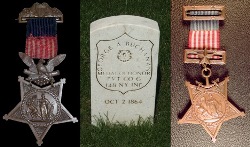 Left: Army Medal of Honor, early design.
Left: Army Medal of Honor, early design.Center: Headstone with recognition for a Medal of Honor recipient.
Right: Navy Medal of Honor; early design.
Special Emphasis
America in World War I: 1917–1919
World War I introduced major changes to government-provided headstones, including size and inscribed features, as well as provisions for foreign-national POWs interred in national cemeteries.
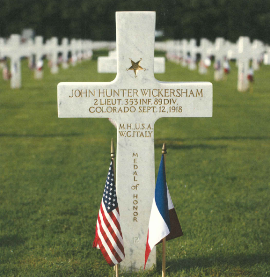 Gravesite of John Hunter Wickersham, WWI Veteran, Medal of Honor recipient. (Photo courtesy of the American Battle Monuments Commission).
Gravesite of John Hunter Wickersham, WWI Veteran, Medal of Honor recipient. (Photo courtesy of the American Battle Monuments Commission).Outreach
World War II Commemorative Series — Allied Forces and Enemy Burials in VA National Cemeteries
NCA's second publication in the series tells the little-known story of how and why members of other nation's military forces came to be buried in our national cemeteries during World War II — both our allies and enemy prisoners of war.
 NCA publication for World War II Allied Forces and Enemies.
NCA publication for World War II Allied Forces and Enemies.Monuments
USS Bennington Monument and Grave Plot
The USS Bennington explosion was among the deadliest peacetime accidents in U.S. Navy history and claimed more lives than the Navy had lost in the nation's most recent conflict, the Spanish-American War. A granite monument was established to honor those lost in the Fort Rosecrans National Cemetery.
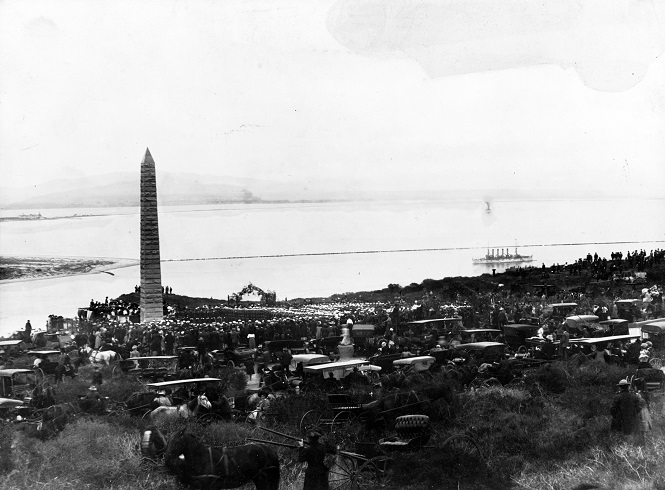 Ceremony dedicating the Bennington monument at Fort Rosecrans, overlooking San Diego harbor, January 7, 1908. The cruiser USS Charleston is visible in the background right. More than 2,500 people attended the dedication. (Naval Heritage and History Command)
Ceremony dedicating the Bennington monument at Fort Rosecrans, overlooking San Diego harbor, January 7, 1908. The cruiser USS Charleston is visible in the background right. More than 2,500 people attended the dedication. (Naval Heritage and History Command)Historic Resources
100 Years of Historic National Cemetery Burial Records
By 2012, NCA completely digitized its original burial system: hand-written ledgers from the 1860s to 1960s. Through a partnership with Ancestry.com, NCA's ledgers — along with others in the National Archives & Records Administration (NARA) collection — are available to Ancestry.com subscribers and free to visitors to NARA facilities.
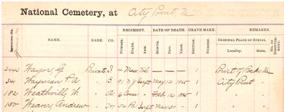 Partial image of NCA hand-written ledger.
Partial image of NCA hand-written ledger.
















